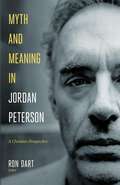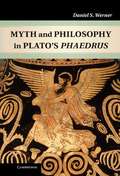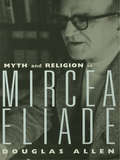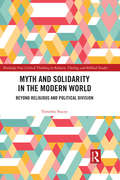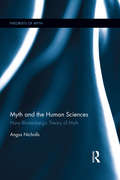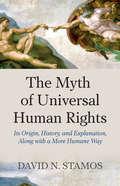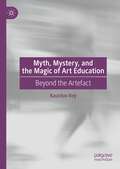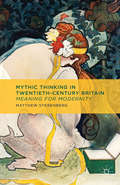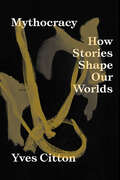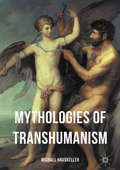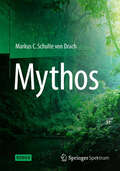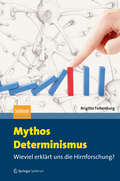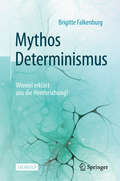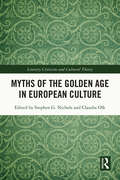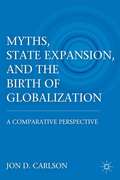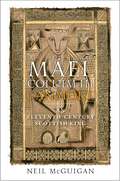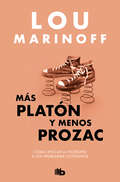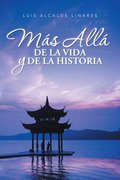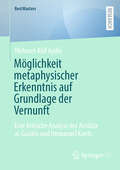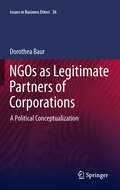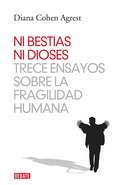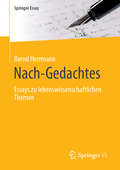- Table View
- List View
Myth and Meaning in Jordan Peterson: A Christian Perspective
by Ron DartPopular philosopher Jordan Peterson has captured the imagination of Western world. For some, Peterson represents all that is wrong with patriarchal culture; for others, he is the Canadian academic prophet who has come to save civilization from dizzying confusion. Regardless of how one feels about him, his influence in North America--and beyond--is difficult to deny. While the "Peterson phenomenon" has motivated numerous articles and responses, much of what has been written is either excessively fawning or overly critical. Little has been produced that explores Peterson's thought--especially his immensely popular 12 Rules for Life--within the context of his overall context and scholarly output. How is one to understand the ascendency of Jordan Peterson and why he's become so popular? Does his earlier Maps of Meaning shed light on how one might understand his worldwide bestseller, 12 Rules for Life? In Myth and Meaning in Jordan Peterson, scholars across various disciplines explore various aspects of Jordan Peterson's thought from a Christian perspective. Both critical and charitable, sober-minded and generous, this collection of ten essays is a key resource for those looking to faithfully engage with Jordan Peterson's thought.
Myth and Philosophy in Plato'S Phaedrus
by Daniel S. Werner"Plato's dialogues frequently criticize traditional Greek myth, yet Plato also integrates myth with his writing. Daniel S. Werner confronts this paradox through an in-depth analysis of the Phaedrus, Plato's most mythical dialogue. Werner argues that the myths of the Phaedrus serve several complex functions: they bring nonphilosophers into the philosophical life; they offer a starting point for philosophical inquiry; they unify the dialogue as a literary and dramatic whole; they draw attention to the limits of language and the limits of knowledge; and they allow Plato to co-opt cultural authority as a way of defining and legitimating the practice of philosophy. Platonic myth, as a species of traditional tale, is thus both distinct from philosophical dialectic and similar to it. Ultimately, the most powerful effect of Platonic myth is the way in which it leads readers to participate in Plato's dialogues and to engage in a process of self-examination"--
Myth and Philosophy in Platonic Dialogues
by Omid TofighianThis book rethinks Plato's creation and use of myth by drawing on theories and methods from myth studies, religious studies, literary theory and related fields. Individual myths function differently depending on cultural practice, religious context or literary tradition, and this interdisciplinary study merges new perspectives in Plato studies with recent scholarship and theories pertaining to myth. Significant overlaps exist between prominent modern theories of myth and attitudes and approaches in studies of Plato's myths. Considering recent developments in myth studies, this book asks new questions about the evaluation of myth in Plato. Its appreciation of the historical conditions shaping and directing the study of Plato's myths opens deeper philosophical questions about the relationship between philosophy and myth and the relevance of myth studies to philosophical debates. It also extends the discussion to address philosophical questions and perspectives on the distinction between argument and narrative.
Myth and Religion in Mircea Eliade (Theorists Of Myth Ser. #Vol. 11)
by Douglas AllenThis multidisciplinary study is the first book devoted entirely to the critical interpretation of the writings of Mircea Eliade on myth. One of the most popular and influential historians and theorists of myth, Eliade argued that all myth is religious. Douglas Allen critically interprets Eliade's theories of religion, myth, and symbolism and analys
Myth and Solidarity in the Modern World: Beyond Religious and Political Division (Routledge New Critical Thinking in Religion, Theology and Biblical Studies)
by Timothy StaceyIn the context of the rise of reactionary politics across the globe, this book seeks new ways of developing solidarity across religious, political and economic differences. Drawing on an increasingly influential Christian theological movement, postliberalism, it claims that the dominance of liberal, secular rationality has blinded people to the fundamental role of transcendence and myth in developing solidarity. The result is either atrophy, or a retrenching in divisive myths of faith, race, nation or economic status. Liberalism is now a dominant force across the globe. But its resonance in the Anglo-Saxon West, from which it originates and has been most fully realized, is relatively underexplored. The book thus follows two simultaneous lines of enquiry. Firstly, a genealogical study of social scientific and policy iterations of the relationship between belief and solidarity in the Anglo-Saxon West, placing postliberal theory into dialogue with the sociology and anthropology of religion, politics and economics. Secondly, it draws from original ethnographic research with groups in London, UK, that seek to develop solidarity in the face of deep-seated difference. By bringing a new way of framing these contentious debates about contemporary society, this research offers tools for more productive conversations around religious and political topics, in particular concluding with a clear policy proposal. It is, therefore, a useful resource for both academics of theology and religious studies, political philosophy, sociology and anthropology; and for politicians, policy makers and practitioners hoping to develop solidarity in the modern world.
Myth and the Human Sciences: Hans Blumenberg's Theory of Myth (Theorists of Myth)
by Angus NichollsThis is the first book-length critical analysis in any language of Hans Blumenberg’s theory of myth. Blumenberg can be regarded as the most important German theorist of myth of the second half of the twentieth century, and his Work on Myth (1979) has resonated across disciplines ranging from literary theory, via philosophy, religious studies and anthropology, to the history and philosophy of science. Nicholls introduces Anglophone readers to Blumenberg’s biography and to his philosophical contexts. He elucidates Blumenberg’s theory of myth by relating it to three important developments in late nineteenth- and early twentieth-century German philosophy (hermeneutics, phenomenology and philosophical anthropology), while also comparing Blumenberg’s ideas with those of other prominent theorists of myth such as Vico, Hume, Schelling, Max Müller, Frazer, Sorel, Freud, Cassirer, Heidegger, Horkheimer and Adorno. According to Nicholls, Blumenberg’s theory of myth can only be understood in relation to the ‘human sciences,’ since it emerges from a speculative hypothesis concerning the emergence of the earliest human beings. For Blumenberg, myth was originally a cultural adaptation that constituted the human attempt to deal with anxieties concerning the threatening forces of nature by anthropomorphizing those forces into mythic images. In the final two chapters, Blumenberg’s theory of myth is placed within the post-war political context of West Germany. Through a consideration of Blumenberg’s exchanges with Carl Schmitt, as well as by analysing unpublished correspondence and parts of the original Work of Myth manuscript that Blumenberg held back from publication, Nicholls shows that Blumenberg’s theory of myth also amounted to a reckoning with the legacy of National Socialism.
Myth of Universal Human Rights: Its Origin, History, and Explanation, Along with a More Humane Way
by David N. StamosIn this groundbreaking and provocative new book, philosopher of science David N. Stamos challenges the current conceptions of human rights, and argues that the existence of universal human rights is a modern myth. Using an evolutionary analysis to support his claims, Stamos traces the origin of the myth from the English Levellers of 1640s London to our modern day. Theoretical defenses of the belief in human rights are critically examined, including defenses of nonconsensus concepts. In the final chapter Stamos develops a method of naturalized normative ethics, which he then applies to topics routinely dealt with in terms of human rights. In all of this Stamos hopes to show that there is a better way of dealing with matters of ethics and justice, a way that involves applying the whole of our evolved moral being, rather than only parts of it, and that is fiction-free.
Myth, Mystery, and the Magic of Art Education: Beyond the Artefact
by Kaustuv RoyThis book provides a new understanding of art education, connecting art, necessity, and pedagogy. Plenty has been written about art education, but its potential contribution to inner autonomy and existential emancipation due to the re-articulation of time and space in art has not been adequately explored in a pedagogic context. This book explores art as an affective continuum--not a plaything of culture, but rather a mode of alignment of the existential Eros with our ontological truth.
Mythic Thinking in Twentieth-Century Britain
by Matthew SterenbergA variety of thinkers used the concept of myth to articulate their anxieties about modernity. By telling the story of mythic thinking in Britain from its origins in Victorian social anthropology to its postwar cultural mainstreaming, this book reveals a yearning for transcendence in an age long assumed to be disenchanted.
Mythocracy: How Stories Shape Our Worlds
by Yves CittonHarnessing the power of storytelling for political progressMythocracy examines the narrative mechanisms that script our lives through the stories we tell one another. Digging beneath common anxieties about fake news, Yves Citton looks at the attention economy, which organises our political perceptions around affective attractors. These are much more powerful than the truth value of any given narrative. The time has come for the left to reclaim the power of myth from reactionary populism.
Mythologies of Transhumanism
by Michael HauskellerThis book examines the dependence of transhumanist arguments on the credibility of the narratives of meaning in which they are embedded. By taking the key ideas from transhumanist philosophy - the desirability of human self-design and immortality, the elimination of all suffering and the expansion of human autonomy - Michael Hauskeller explores these narratives and the understanding of human nature that informs them. Particular attention is paid to the theory of transhumanism as a form of utopia, stories of human nature, the increasing integration of the radical human enhancement project into the cultural mainstream, and the drive to upgrade from flesh to machine.
Mythos
by Markus C Schulte von DrachEine Expedition ins Herz des Dschungels. Eine Reise an den Anfang und das Ende des Glaubens. Eine abenteuerliche Auseinandersetzung mit der Religion und der Evolution. Im Jahr 1539 begegnet der spanische Konquistador Juan de la Torre im Amazonasdschungel dem Teufel. Als fast 500 Jahre später die deutsche Schriftkundlerin Nora Tilly im Indienarchiv von Sevilla auf Dokumente des Spaniers stößt, entdeckt sie Hinweise auf einen Inka-Schatz. Doch bald muss sie feststellen, dass sie nicht die einzige ist, die sich auf den Weg macht, um das Gold zu finden. Die irische Journalistin Brea MacLoughlin reist mit einer Delegation katholischer Geistlicher ebenfalls nach Peru, um ein angebliches Wunder in den Anden zu überprüfen. Zu dieser Delegation gehört auch der junge Priester Arnaud d'Albret, der in Südamerika über eine ihm verbotene Liebe hinwegzukommen hofft. Nach dem gewaltsamen Tod seines Mentors schließt d'Albret sich Nora Tilly an. Auch Brea MacLoughlin folgt der Expedition der Schatzsucher. Im Dschungel Perus entdeckt unterdessen der Biologiestudent Francisco Pérez etwas, das eigentlich nicht existieren dürfte: das fünfzehn Millionen Jahre alte Fossil eines Riesenkrokodils, in dessen Schädel eine Pfeilspitze steckt. Der Versuch, dieses Rätsel zu lösen, führt ihn schließlich mit den Schatzjägern aus Europa zusammen. Doch was die Expedition im Dschungel erwartet, ist nicht nur das Gold der Inka. Tief im Wald stoßen sie auf etwas, das ihr Weltbild in Stücke reißt. ......... "Eine abenteuerliche Melange aus Dawkins' Gotteswahn, Indiana Jones und Jurassic Park. Schulte von Drach gelingt, was Dan Brown nie schaffte: den Leser zu fesseln, ohne seinen Verstand zu lähmen. Absolut empfehlenswert!" Michael Schmidt-Salomon, Philosoph und Schriftsteller, Vorstandssprecher der Giordano-Bruno-Stiftung, Autor von "Jenseits von Gut und Böse" "Wie viel Menschenwerk steckt in der Religion? Im Unterschied zum ätzenden Stil neoatheistischer Gotteswahn-Polemik setzt dieses Buch auf eine Strategie à la Umberto Eco: Der Reigen religionskritischer Überlegungen ist eingepackt in eine Rahmenhandlung, deren Spannung - Science-Fiction und Thriller im besten Sinn - den Leser mitnimmt zu den Etappen der intellektuellen Auseinandersetzung." Christian Kummer, Biologe, Philosoph und Jesuit, Professor an der Hochschule für Philosophie in München, Autor von "Der Fall Darwin" _____ Terra X und Theodizee, Evolution und El Dorado, Schatzjagd und Gottessuche - Markus C. Schulte von Drachs neuer Roman entführt Sie auf eine abenteuerliche Reise um die halbe Welt und zurück bis ins 16. Jahrhundert: Von Sevilla, Kismayoo, Florida und Iquitos aus machen sich seine Helden auf den Weg ins Herz des Amazonas-Regenwaldes. Auf der Suche nach dem legendären Inka-Gold, einem unglaublichen Fossil und ihrem Seelenfrieden stoßen ein französischer Priester, eine deutsche Schatzjägerin, eine irische Journalistin, ein peruanischer Biologiestudent und ein türkischer Kreationist auf die Spuren des Matararo. Doch gibt es dieses Wesen überhaupt? Lassen Sie sich von den Abenteuern genauso fesseln wie von den Auseinandersetzungen über Religion und Wissenschaft, die diesen Thriller so außergewöhnlich machen. Folgen Sie den unterschiedlichen Persönlichkeiten auf ihrem Weg, bis am Ende alle gemeinsam vor einer einzigen Aufgabe stehen: zu überleben.
Mythos Determinismus
by Brigitte FalkenburgAus Sicht von Neurobiologen regiert das neuronale Geschehen im Kopf unser Bewusstsein. Als Physikerin und Philosophin hinterfragt die Autorin in diesem Buch die Aussagen von Hirnforschern und stellt fest, dass die Neurobiologie an längst überholten mechanistischen Vorstellungen festhält und dadurch zu Fehlschlüssen über den menschlichen Geist und den freien Willen gelangt. Der Band liefert die Grundzüge einer Wissenschaftstheorie der Hirnforschung und weist damit den Weg zu einem differenzierteren Naturverständnis und Menschenbild.
Mythos Determinismus: Wieviel erklärt uns die Hirnforschung?
by Brigitte FalkenburgAus der Sicht der Neurobiologie regiert im Kopf das neuronale Geschehen. Doch was wissen die Hirnforscher genau über die Mechanismen des Hirngeschehens und ihren Einfluss auf den menschlichen Geist? Dieser Frage geht Brigitte Falkenburg nach. Die Physik hat sich längst vom mechanistischen Weltbild gelöst, in der Neurobiologie bleiben überholte mechanistische Vorstellungen bis heute wirksam. Dabei sind die "mechanistischen" Erklärungen der Hirnforschung ganz anders als ihr Name suggeriert; und wer annimmt, der Geist sei so strukturiert wie die Materie, zieht atomistische und kausale Fehlschlüsse über das Bewusstsein. Falkenburgs Buch möchte die Debatte um Geist und Gehirn, freien Willen und Determinismus endlich davon befreien. Es liefert Grundzüge einer Wissenschaftstheorie der Hirnforschung und eröffnet den Weg zu einem differenzierteren Naturverständnis und Menschenbild. Das beliebte Sachbuch ist für die zweite Auflage vollständig überarbeitet und aktualisiert worden.
Myths of the Golden Age in European Culture (Literary Criticism and Cultural Theory)
by Claudia Olk Stephen G. NicholsHesiod’s concept of a Golden Age, together with analogous myths – Babylonian, Egyptian, Hebrew, etc. – speak to the psychic appeal, perhaps even deep-rooted need, for humans to conceive alternate worlds free from the anguish, toil, and dangers of the one they inhabit. Classical poets and philosophers explored the myth; the Middle Ages imagined it as the land of Cockaigne; Early Modern dramatists incorporated it; Romantic poets and nineteenth-century writers imagined it in various guises. This volume explores the configuration presented by Hesiod and the history of its reception and transformation in European literature and culture. The chapters study how texts written in specific historical moments of European history reshape elements of the myth to explore contemporary issues of concern. The book addresses these issues of cultural hybridization, and, from a transhistorical perspective, provides new insights into the dynamics of epochal shifts. It also looks at similar configurations in non-Western civilizations (China), which complements the spectrum of contributions that covers periods from classical antiquity to the Age of Goethe.
Myths, State Expansion, and the Birth of Globalization
by Jon D. CarlsonMany of the present problems of 'globalization' are mirrored in the historical expansion of the European state system. This title is a structured, comparative case study analysis of four regions and examines how these regions and their peoples were absorbed into the expanding European-centered state system from roughly the 1400s through to 1800.
Máel Coluim III, 'Canmore': An Eleventh-Century Scottish King
by Neil McGuiganA study of the life and times of the great king known for his role in Macbeth&’s downfall, his marriage to St. Margaret, and his dealings with the Normans. The legendary Scottish king Máel Coluim III, also known as &“Malcolm Canmore,&” is often held to epitomize Scotland&’s &“ancient Gaelic kings.&” But Máel Coluim and his dynasty were in fact newcomers, and their legitimacy and status were far from secure at the beginning of his rule. Máel Coluim&’s long reign from 1058 until 1093 coincided with the Norman Conquest of England, a revolutionary event that presented great opportunities and terrible dangers. Although his interventions in post-Conquest England eventually cost him his life, the book argues that they were crucial to his success as both king and dynasty-builder, creating internal stability and facilitating the takeover of Strathclyde and Lothian. As a result, Máel Coluim left to his successors a territory that stretched far to the south of the kingship&’s heartland north of the Forth, like the Scotland we know today. This book explores the wider political and cultural world in which Máel Coluim lived, guiding the reader through the pitfalls and possibilities offered by the sources that mediate access to that world. Our reliance on so few texts means that the eleventh century poses problems that historians of later eras can avoid. Nevertheless, Scotland in Máel Coluim&’s time generated unprecedented levels of attention abroad and more vernacular literary output than at any time prior to the Stewart era.
Más Platón y menos Prozac
by Lou MarinoffUn libro diferente que, con sencillez, nos acerca al pensamiento de grandes filósofos como Platón, Sócrates o Kant y demuestra que la filosofía puede ser una opción para lograr una vida más satisfactoria. ¿Puede la filosofía combatir los problemas y dificultades cotidianos? Esto es precisamente lo que propone Más Platón y menos Prozac: aplicar la filosofía a nuestro sistema de vida para alcanzar un mayor equilibrio interior. Se trata de considerar la filosofía como una forma de vida más que como una disciplina, idea que existe desde Sócrates. Más Platón y menos Prozac se inspira en los más importantes filósofos de la historia para enseñarnos a afrontar los principales y más habituales aspectos de la vida, el amor, la ética, prepararse para morir o simplemente enfrentarse a un cambio de trabajo.
Más Platón y menos Prozac
by Lou MarinoffUn libro diferente que, con sencillez, nos acerca al pensamiento de grandes filósofos como Platón, Sócrates o Kant y demuestra que la filosofía puede ser una opción para lograr una vida más satisfactoria. ¿Puede la filosofía combatir los problemas y dificultades cotidianos? Esto es precisamente lo que propone Más Platón y menos Prozac: aplicar la filosofía a nuestro sistema de vida para alcanzar un mayor equilibrio interior. Se trata de considerar la filosofía como una forma de vida más que como una disciplina, idea que existe desde Sócrates. Más Platón y menos Prozac se inspira en los más importantes filósofos de la historia para enseñarnos a afrontar los principales y más habituales aspectos de la vida, el amor, la ética, prepararse para morir o simplemente enfrentarse a un cambio de trabajo.
Más allá de la vida y de la historia
by Luis Alcalde LinaresDesde hace tiempo tengo la sensación de que la vida solo es sueño e ilusión, tengo esa sensación porque no somos conscientes de lo que somos y de lo que hacemos, es decir, que hacemos las cosas por rutina, por costumbre. Quiero decir que el que más o el que menos, hace las mismas cosas todos los días y a la misma hora, hasta tiene la mala costumbre de ir al baño. Supuestamente hemos venido o estamos aquí para evolucionar la especie, o sea, para crecer, ¿con qué propósito? Quizás el de alcanzar la quinta dimensión. Quizás tenga otro propósito la vida, pero lo que es evidente, es que tenga el propósito que tenga la vida, creo que los seres humanos no son felices con su hábitat, ya que no se sienten realizados ni con su vida ni con su persona. Es por eso que he presentado este título y este libro, que es el quinto que publico aunque el mundo de las editoriales está muy complicado. Ojalá y ese es mi deseo, que ustedes tengan laoportunidad de echarle un vistazo al contenido de este libro.
Möglichkeit metaphysischer Erkenntnis auf Grundlage der Vernunft: Eine kritische Analyse der Ansätze al-Ġazālīs und Immanuel Kants (BestMasters)
by Mehmet Akif AydinDie Frage nach der rationalen Beweisbarkeit Gottes spielt eine zentrale Rolle in der rationalen Theologie (ʿilm al-kalām). Theologen betrachten sie als den ersten Schritt bei der Auseinandersetzung mit der Religion, da ein Wahrheitsanspruch, der allein auf den Aussagen eines Propheten basiert, letztlich zu einem Zirkelschluss führen würde. Daher muss die Existenz Gottes zunächst rein rational bestimmt werden. Ob die Vernunft jedoch ausreicht, um metaphysische Angelegenheiten zu erfassen, ist umstritten. Diese Arbeit untersucht die kritischen Ansätze al-Ġazālīs (gest. 1111) und Immanuel Kants (gest. 1804) zur Frage der metaphysischen Erkenntnis und beleuchtet die Grenzen, auf die die Vernunft bei der Erfassung metaphysischer Fragestellungen stößt.
NGOs as Legitimate Partners of Corporations
by Dorothea BaurThe interaction between corporations and non-governmental organizations (NGOs) has become an important topic in the debate about corporate social responsibility (CSR). Yet, unlike the vast majority of academic work on this topic, this book explicitly focuses on clarifying the role of NGOs, not of corporations, in this context. Based on the notion of NGOs as political actors it argues that NGOs suffer from a multiple legitimacy deficit: they are representatives of civil society without being elected; the legitimacy of the claims they raise is often controversial; and there are often doubts regarding the legitimacy of the behaviour they exhibit in putting forward their claims. Set against an extended sphere of political action in the postnational constellation this book argues that the political model of deliberative democracy provides a meaningful conceptualization of NGOs as legitimate partners of corporations and it develops a conceptual framework that specifically allows distinguishing legitimate partner NGOs from two related actor types with whom they share certain characteristics but who differ with respect to their legitimacy. These related actor types are interest groups on the one hand and activists on the other hand. In conclusion it argues that a focus on the behaviour of NGOs is most meaningful for distinguishing them from interest groups and activists.
NGOs, Political Protest, and Civil Society
by Carew BouldingThis book argues that non-governmental organizations (NGOs) have an important effect on political participation in the developing world. Contrary to popular belief, they promote moderate political participation through formal mechanisms such as voting only in democracies where institutions are working well. This is a radical departure from the bulk of the literature on civil society that sees NGOs and other associations as playing a role in strengthening democracy wherever they operate. Instead, Carew Boulding shows that where democratic institutions are weak, NGOs encourage much more contentious political participation, including demonstrations, riots, and protests. Except in extreme cases of poorly functioning democratic institutions, however, the political protest that results from NGO activity is not generally anti-system or incompatible with democracy again, as long as democracy is functioning above a minimal level. "
NI BESTIAS NI DIOSES (EBOOK)
by Diana Cohen AgrestLa tiranía del tiempo, el aburrimiento, la pereza, la felicidad, el autoengaño, la envidia, el morbo, el miedo, la verg enza, el perdón, la vejez, la muerte, la inmortalidad# Los trece ensayos aquí reunidos se consagran a examinar el material emocional que impulsa nuestras decisiones. Interrogarnos acerca de estas encrucijadas existenciales, cual estaciones de una travesía, nos ofrece la posibilidad de comprender los resortes con los que vamos perfilando nuestra propia vida. Entrelazando exquisitas contribuciones del psicoanálisis, la sociología, la antropología y la literatura en un fino entramado filosófico, la autora nos convoca a volvernos hacia nuestras fibras más personales, clausurando así el divorcio entre el pensar y el sentir. Diana Cohen Agrest nos acompaña en la elucidación de trece laberintos que nos conmueven en nuestra humana fragilidad. A través de un itinerario tan lúcido como provocativo, nos compromete íntimamente en una reflexión sin concesiones en torno de nosotros mismos y de nuestros vínculos con los otros.
Nach-Gedachtes: Essays zu lebenswissenschaftlichen Themen (Springer Essay)
by Bernd HerrmannDie hier zusammengestellten Essays über lebenswissenschaftliche Themen sind selbstständige, unverbunden entstandene Darstellungen. Der Buchtitel spielt einerseits mit der zeitbestimmenden Präposition; andererseits, und auch das deutet der Gedankenstrich an, geht es um verknüpfte Überlegungen. Es sind Reflexionen über Angelegenheiten der Wissenschaft, für die in der eigentlichen wissenschaftlichen Literatur weder formal noch inhaltlich Platz wäre. Die hier zusammengestellten Essays haben zwar sämtlich einen konkreten Anlass. Sie problematisieren die aufgeworfenen Fragen dann aber in einer grundsätzlicheren Weise.
